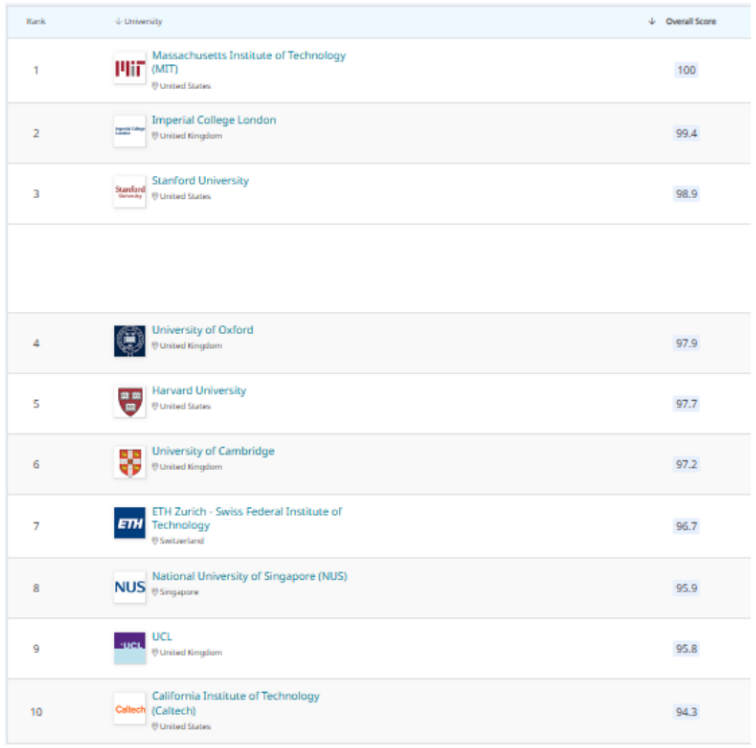QS World University Rankings 2026 list includes 54 Indian universities. Discover the Top 10 Indian private universities ranked globally for academic excellence, research, sustainability, and global engagement. India ranks 4th globally.

QS World University Rankings 2026 have been officially released, revealing the most comprehensive and competitive list of global institutions to date. With 1,501 ranked institutions spanning 106 countries and 112 newly ranked universities, this year’s edition marks a milestone in higher education assessments worldwide. A moment of immense pride for India, 54 Indian universities have secured their place in the QS World University Rankings 2026, showcasing the country’s ongoing rise in global academia.
India’s performance in the QS World University Rankings 2026 reflects a remarkable transformation in its higher education sector. With a significant increase in representation, improved rankings, and growing global recognition, Indian universities have demonstrated strong progress across various indicators.
The table below summarises the key highlights of India’s performance in this year’s rankings:
| QS World University Rankings 2026 Highlights | |
| Insight | Details |
| Total Indian Universities Ranked | 54 institutions featured, making India the 4th most represented country globally. |
| Countries Ahead of India | Only the USA (192), the UK (90), and Mainland China (72) have more universities ranked. |
| New Entrants from India | 8 Indian institutions entered the rankings for the first time – the highest for any country this year. |
| Growth Since 2015 | The number of ranked Indian universities increased from 11 in 2015 to 54 in 2026 – a five-fold growth. |
| Improved Rankings | 48% of Indian universities improved their positions compared to last year. |
| Top 250 Representation | 6 Indian institutions ranked among the global top 250. |
| Highest-Ranked Indian Institute | IIT Delhi, ranked 123rd, improved from 150th in 2025. |
| Notable Rank Jump | IIT Madras moved up 47 places, from 227 in 2025 to 180 in 2026. |
| Indian Institutes of Technology (IITs) | 12 IITs featured in the 2026 rankings, showing strong representation. |
| Employer Reputation | 5 Indian institutions ranked in the global top 100 for Employer Reputation. |
| Citations per Faculty | 8 Indian universities in the top 100 globally with an average score of 43.7, surpassing Germany, UK, and USA. |
| Diversity of Institutions | Includes a broad mix of public and private institutions: central universities, deemed universities, and technical institutes. |
The QS World University Rankings 2026 evaluate universities using a powerful methodology that emphasises academic reputation, employability, research impact, global engagement, and sustainability. These rankings are among the most respected globally, offering a benchmark for institutional excellence.

Source: qschina.cn
This year’s list includes several notable shifts and consistent performers. Massachusetts Institute of Technology (MIT), USA, retained its No. 1 position for the third year running. The most significant climb among the top 10 was made by Stanford University, which advanced from sixth to third, thanks to enhancements in sustainability initiatives and faculty internationalisation.
| QS World University Rankings 2026 Overview | |
| Parameter | Details |
| Ranking Authority | Quacquarelli Symonds (QS) |
| Edition | 20th Edition (2026) |
| Total Institutions Ranked | 1,501 |
| Countries/Locations Represented | 106 (up from 103 in 2025) |
| New Institutions Ranked | 112 |
| Top Ranked University | Massachusetts Institute of Technology (MIT), USA |
| Most Represented Country | United States (192 institutions) |
| Highest Climber Globally | Sunway University, Malaysia (↑129 positions) |
| Top Indian Institute | Indian Institute of Technology Delhi (Rank =123) |
| Total Indian Institutions Ranked | 54 |
| India’s Rank in Representation Globally | 4th (after USA, UK, and China) |
| Most Improved Indian Institutions (%) | 41% of ranked Indian universities improved their positions |
| Ranking Methodology Indicators | Academic Reputation, Employer Reputation, Faculty/Student Ratio, Citations per Faculty, International Student & Faculty Ratio, International Research Network, Sustainability |
| Key Focus Areas in 2026 Rankings | Research Output, Internationalisation, Sustainability, and Employability |
At the pinnacle of the QS World University Rankings 2026 List, the Massachusetts Institute of Technology (MIT), USA, continues its authority as the best university in the world for the third consecutive year. The stability in the top 10 reflects a mature competition among elite institutions. Below are the top contenders:
| Top 10 in the QS World University Rankings 2026 | ||
| Rank | Institution | Change from 2025 |
| 1 | MIT, USA | 0 |
| 2 | Imperial College London, UK | 0 |
| 3 | Stanford University, USA | +3 |
| 4 | University of Oxford, UK | -1 |
| 5 | Harvard University, USA | -1 |
| 6 | University of Cambridge, UK | -1 |
| 7 | ETH Zurich, Switzerland | 0 |
| 8 | National University of Singapore | 0 |
| 9 | University College London (UCL), UK | 0 |
| 10 | California Institute of Technology, USA | 0 |
Stanford University showed the most notable climb due to improvements in sustainability and international faculty indicators.
India has also been one of the most improved countries this year. According to the report, 41% of Indian institutions improved their rankings, with only 20% seeing a decline, indicating consistent progress compared to other global counterparts.
Among the standout institutions globally:
The QS World University Rankings 2026 India list showcases a landmark development—54 Indian universities now appear in the rankings, up from just 11 in 2014. This impressive five-fold increase highlights the success of India’s policy reforms and academic initiatives under the National Education Policy (NEP) 2020.
The top Indian performers in the QS World University Rankings 2026 are:
| QS World University Rankings 2026 India List | |
| Institution | Rank |
| Indian Institute of Technology Delhi (IITD) | =123 |
| Indian Institute of Technology Bombay (IITB) | 129 |
| Indian Institute of Technology Madras (IITM) | 180 |
| Indian Institute of Technology Kharagpur (IIT-KGP) | =215 |
| Indian Institute of Science, Bangalore (IISc) | =219 |
| Indian Institute of Technology Kanpur (IITK) | 222 |
| University of Delhi | =328 |
| Indian Institute of Technology Guwahati (IITG) | =334 |
| Indian Institute of Technology Roorkee (IITR) | =339 |
| Anna University | =465 |
Notably, IIT Delhi re-entered the rankings after a two-year gap and is now tied with the Georgia Institute of Technology, a testament to its research and academic growth.
Several Indian private universities have made commendable progress in the QS World University Rankings 2026. Noteworthy mentions include:
These institutions have demonstrated excellence in global engagement, international research collaborations, and student diversity.
India’s Education Minister Dharmendra Pradhan stated,
“With a record 54 HEIs featuring among the global best, India hits a new high in the QS World University 2026 Rankings. From just 11 in 2014 to 54 now, this five-fold jump is a testament to the transformative educational reforms ushered by PM Narendra Modi ji’s government.”
This ranking strengthens India’s emergence as the fastest-growing education system among G20 nations and the fourth most represented country after the US, UK, and China.
The QS World University Rankings 2026 adopt a comprehensive methodology that evaluates institutions through several lenses and indicators. These include:
| Methodology Behind the QS World University Rankings 2026 | |
| Lens | Indicators |
| Research & Discovery | Academic Reputation, Citations per Faculty |
| Learning Experience | Faculty-Student Ratio |
| Employability | Employment Outcomes, Employer Reputation |
| Global Engagement | International Student & Faculty Ratios, Research Network, Diversity |
| Sustainability | Environmental and institutional impact |
These metrics ensure a holistic assessment of academic quality, global relevance, and institutional effectiveness.
The QS World University Rankings 2026 have not only spotlighted global giants like MIT and Oxford but have also given India its much-deserved recognition on the world academic map. Institutions like IIT Delhi, IIT Bombay, and IISc Bangalore have cemented their global stature, while several private universities are fast catching up.
With the consistent implementation of NEP 2020, growing international collaborations, and a focused drive towards research and sustainability, India is well on its path to becoming a global education powerhouse.
As the QS World University Rankings 2026 demonstrate, the nation’s academic future is not just promising—it is already unfolding on the global stage.
Ready to boost your UPSC 2025 preparation? Join PW’s UPSC online courses today!
The QS World University Rankings 2026 List is a global evaluation of top universities, ranked based on academic reputation, research, and international outlook.
The QS World University Rankings 2026 India List includes 54 Indian institutions, highlighting both public and private universities’ global standing.
Institutions like Shoolini University, Chandigarh University, and VIT lead the QS world ranking Indian private universities with strong performance indicators.
Top 10 Indian universities in world ranking include IIT Delhi, IIT Bombay, IISc Bangalore, and others that have shown consistent academic and research excellence.
According to the rankings, 41% of Indian institutions improved their rank in the QS World University Rankings 2026.
NEP 2020 reforms, global collaborations, and focus on innovation and research have significantly boosted India’s position in the QS World University Rankings 2026.
<div class="new-fform">
</div>